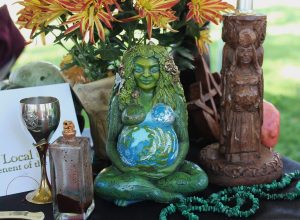It would seem that there is something of a “zeitgeist” moving a number of bloggers right now. I have been blogging about the matter of Spiritual Authority and Hierarchies for the past two weeks. John Beckett dropped a post yesterday entitled “Get Over Your Fear of Religion!” which basically exhorted people to address their religious baggage. (Yay! Glad to have you on board, Mr Beckett!) And Laura Tempest Zakroff dropped her own take (“One Order of Witchcraft Medium-Rare, Hold the Gods please”), which seemed to come at the same matter from the opposite end of the spectrum.
Like I said, it feels like a number of us are poking at the same nebulous mass (albeit from different angles). I was going to post the third part of my series on authority and hierarchies today, but after reading these posts, I have things to say, and say them I shall.
Religion and Baggage
I’m going to begin with John Beckett’s post, as that is the post I came across first. On the one hand, I couldn’t agree more with his points that Pagans need to get over previous religious baggage, and that there are very definite benefits to religion. However, I have real issues with looking to the framework of other (typically monotheistic) religions for a model of how Pagan religion should look now. Granted, this may not have been Beckett’s intention here, however, I don’t think you can extol the virtues of religion for Pagans without also going into what Pagan religion could look

like.
To my mind, this is an important distinction to make too, because when you use a word like “religion” – like any word – it comes with certain expectations of what that thing looks like. And after something like 1500-2000 years of predominantly Judeo-Christian religion, we really need to ask what that looks like for a good chunk of us. In other words, how does the shape of Abramic religion affect the shape we give to Pagan religion?
Let’s take Christianity, for example. Christianity is universalist, in fact, new adherents are actively sought. It’s also orthodoxic in nature, meaning that having the “correct” belief is of the utmost importance. Relationships with deity require submission, and the end reward for good behavior comes after death.
Now compare this with what we (think we) know of Heathen period religion. Here “religion” goes hand in hand with

community, and is made up of the reciprocal relationships held by that community and the customs by which they are maintained (orthopraxy). Religion is not universal, and though there are common threads between groups that are culturally similar enough, it differs by tribe. There are no active attempts to seek out new adherents either, as it is handed down from parent to child. Joining the religion in these cases, is more of a case of tribal enculturation. Afterlife beliefs vary from group to group.
See what I mean? That’s quite a difference! However instead of exploring that, as a group we tend to throw the baby out with the bathwater and make weak arguments about “being spiritual instead of religious”.
Along similar lines are the following statements:
“I don’t pray, I chat with my gods.”
“I don’t kneel, that’s a Christian thing.”
“I don’t worship, I honor my gods.”
And it doesn’t matter that the acts of prayer and kneeling is well attested among multiple pagan cultures, or that worship (meaning “to give worth to/acknowledge the worth of”) is the perfect word for what we do, we just keep running.
So I see this issue as twofold: on the one hand, we avoid anything that looks a little too much like the religions we ran from; and on the other, we allow those religions to continue defining our worlds for us.
Don’t believe me on the last one? Consider the Devil for a moment. How do you feel about him? If you’re getting an icky feeling, where do you think that’s coming from? And yet from the probable perspective of someone from the Pagan period, he’d be another animistic power to trade the troll market with (as always, terms and conditions may apply).
Hold the Gods!
On the opposite end of the spectrum, Laura Tempest Zakroff’s post argued for the validity of witchcraft without deities – or at least, devotional relationships with those deities.
I’m not going to lie, I think that’s also a problematic approach to take. As I discussed in my last post on Authority and Hierarchies, having reciprocal relationships with higher powers was a part of having spiritual authority. Hell, even the virtue of piety itself was something that could be held up as a form of authority when trucking with the dead.
This is not to completely slate Ms Zakroff’s post (apologies if that is the wrong honorific, I’m happy to amend  accordingly, as I do respect her). I do think she makes an excellent point about the duotheisms held dear by the earlier Pagan revivalists, and their incompatibility with both modern and ancient ideas on deity. But does that mean that we should once more throw out yet another baby with the water it was bathing in? (Which per this account was a dirty dirty water, possibly filled with spunk and other sexual fluids.) Does that mean that we let (this time) Wiccan ideas on deities in witchcraft define the matter of deities for all witches? Because witch or not, you don’t have to have a god and a goddess. And while it’s true that witchcraft can be practiced without deities, in the old accounts and old charms, there was always the matter of the witch requiring the authority to work her craft (be that authority the Devil or Fairies, or Yahweh).
accordingly, as I do respect her). I do think she makes an excellent point about the duotheisms held dear by the earlier Pagan revivalists, and their incompatibility with both modern and ancient ideas on deity. But does that mean that we should once more throw out yet another baby with the water it was bathing in? (Which per this account was a dirty dirty water, possibly filled with spunk and other sexual fluids.) Does that mean that we let (this time) Wiccan ideas on deities in witchcraft define the matter of deities for all witches? Because witch or not, you don’t have to have a god and a goddess. And while it’s true that witchcraft can be practiced without deities, in the old accounts and old charms, there was always the matter of the witch requiring the authority to work her craft (be that authority the Devil or Fairies, or Yahweh).
 I shall go into a hare,
I shall go into a hare,
With sorrow and sych and meickle care;
And I shall go in the Devil’s name,
Ay while I come home again
Isobel Gowdie, of course.
The most striking thing for someone who spends a lot of time reading both old grimoires and ancient texts about magic though, is how much our expectations of magic have lowered over the years. There was a time when it was perfectly reasonable to have spells for getting your animated divinatory skull back under control. But now what do we have? To quote Ms Zakroff, “magic as an every day practice to change you, your living space, and the world around you. There’s no chapter on “how to choose your patron deities” – but there may be one on finding your inner goddess.”
So were those earlier spells just delusional?
I’m not so sure; let me tell you a story.
Once upon a time, I was perusing the vendors at a Pagan convention. One vendor was selling (among other things), little sequined books that she was calling “wish books”, the idea being that you write wishes in them and they would come true. Nice novelty, but no one who is magically operant is going to take that seriously. However, as I was looking through her wares, an African gentleman came up and honed in on these “wish books”, wanting to know if they really worked. You see, as someone who had grown up in a place in which witchcraft is a very real prospect that is routinely thought capable of things we might think fantastical, he was as serious as a heart attack. The vendor

when faced with this, recognized her conundrum: she could either admit that her products were bunk, or she could lie to the gentleman and potentially face his wrath down the line. Because in his culture, you can bet that bought magic is considered the same as any other product that doesn’t work when it doesn’t work!
So were those older spells delusional? I doubt that gentleman would think so – or any number of people around the world actually. As a community, we talk a lot about “reenchanting the world”, as though the whole world is missing its enchantment, but maybe it’s just our bits of it?
Final Words
I’ve covered a lot of ground here (that’s happening a lot at the moment), but if I were to boil down my points, they would be as follows:
1. Religion itself isn’t a bad thing, but we need to stop running and start figuring out what that can look like for us.
2. We also need to stop throwing out bathwater babies because of how others define things (seriously, we’re creating an army of Útburðir). Don’t like Wicca-esque duotheisms? You don’t need to dump all ideas of forming relationships with animistic powers.
3. It’s about reciprocal relationships, and no matter how awesome your inner goddess is, she probably is going to still be useless if you ever find yourself up shit creek without a paddle with things going sideways faster than the fools at my gym who try to use the treadmills sideways. Plus side though, you can always try shitting yourself, so there is that.
4. It’s also about expectations, and we cannot reenchant the world if we’re not only removing the animistic powers, but also simultaneously lowering our expectations of what magic can do.
So there you go! My Monday ramblings about all the things. I’m still aiming to get the third part of my series out this week (probably on Thursday), but the posts by Mr Beckett and Ms Zakroff were too relevant to ignore.
Have a good week, everyone!

